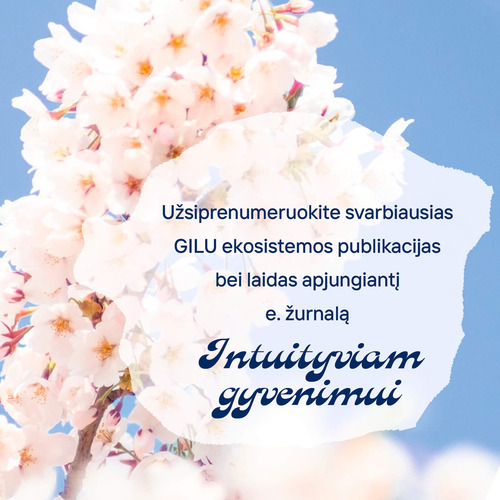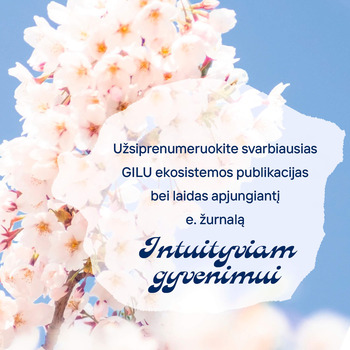Publications
- Home
- Publications
- Philosopher and movement teacher Justas Kučinskas: how we move is how we think (I)
Philosopher and movement teacher Justas Kučinskas: how we move is how we think (I)
2023 01 29LRT.lt
Justas Kučinskas, philosopher, founder and teacher of the Movement School, recalls the ancient Greek saying "A healthy body is a healthy soul" and another less well-known one "Don't trust any thought that comes to you while sitting down", which show the necessary connection between the body and mental activity.
So who is an intellectual person and how important is bodily sensation and intuition in his life?
- Justai, what is the intuitive life for you and how would you define it?
- Perhaps I would start with the word "intuition". In my understanding, this word refers to a certain kind of knowledge - pre-linguistic, pre-conceptual. It is a situation in which clarity about a phenomenon comes before the verbal articulation of that clarity, its explanation. It seems to me that everyone in their everyday life encounters the world and acts in it first intuitively, and the rational analysis of a situation always comes a little later. The rational mind often acts to justify what is already intuitively understood.
Another example is physical action. We walk intuitively without thinking too much about which foot we are going to start with or how the action of the feet will be complemented by the movement of the hands. Let's say we are reaching to pick up a coffee cup from the second row of cups on the bottom shelf: we don't think about what our feet are doing, how far our knees are bent, or which of the myriad of possible trajectories the hand is taking towards the cup. We do a lot of infinitely complex things intuitively. If our bodies only did what we analytically understand and know clearly, life in this infinitely complex reality would be impossible.
- If intuitive knowledge is so important, why do we pay so little attention to this form of knowledge in our education?
- You have made an excellent point: intuitive, everyday knowledge, although it may be the most important, is often not the most important. At least in the formal scientific perspective of understanding the world.
I suspect that this is because the word is over-mystified, often by placing an equal sign between intuitive and correct knowledge. This is why many people reject the subject of intuition altogether: hence the age-old distinction in philosophy between episteme (Greek: cognition, knowledge) and doxa (opinion, superstition), with the more reliable source of knowledge of the world being the logical (Greek: logos) process of thinking, i.e. the process of thinking that conforms to a set of rules.
I believe that we should not fall into this dichotomy of truth and untruth when talking about intuition. Intuition is the result of previous understandings, of successful and unsuccessful attempts and experiences. It is an experience that has been transformed into pre-conceptual knowledge, which allows us to orient ourselves in a complex environment with lightning speed, to act even without fully understanding the totality of the context. Depending on the experience gained and, very importantly, on the linguistic reflection of that experience, intuition can be useful or it can lead down the wrong path.
Man is a living organism operating in a complex and constantly changing environment. Nothing, no science, no information, can give the right definitive instructions on how a person should behave in every situation, because no two people or situations will ever be the same. The teacher is only life itself, only the results of the actions taken and the constant correction. In this living process of learning, what can be described as intuition is born. If the living learning process stops, the actual living understanding of the world is replaced by habits, automatisms, which very often ignore reality.
This is perhaps the most important distinction in trying to define whether life is intuitive or not. I have to distinguish whether I am living guided and imprisoned by habit, by a certain unchanging image of myself and of the world, and therefore in constant conflict with reality, or whether I am acting truly intuitively - out of the totality of living experiences and the constant correction of this totality in relation to an ever changing world.
- Of course, in a human being everything works as a whole, so the ability to know how to control, to feel the body, also means better mind control, self-regulation, self-knowledge. How would you describe what bodily intelligence is and what distinction would you draw between it and rationality?
- It seems to me that the mere posing of such a question is more important than the possible answers. Because really, when we say 'intelligent person', we first of all think that this person is well-read, able to think vividly and broadly, to make useful decisions, well, perhaps to manage his or her emotions, to interact with other people in a proper and respectful way - we call it rational intelligence and emotional intelligence, but that's it, we don't think of the body, the movements, the gestures, the physique of the person.
It is common to think of intellectual abilities as certain configurations of the brain taking place in some body that is not connected to this process at all. But the ancient Greek saying "A healthy body is a healthy mind" or the less well-known "Don't trust any thought that comes to you while you are sitting" suggests a necessary link between the body and mental activity.
Thinking and exercising and doing it in the same place at the same time seemed to be a given in this culture that shaped Europe. I think that our modern culture has perhaps oversimplified this saying by saying 'Well, yes, physical activity improves well-being, it pumps blood to the brain, it makes people think more productively, it makes them remember more' and so on.
Such an approach would be too reductive, turning the body into a mere mechanical brain-bearing apparatus, whose maintenance is necessary to the extent that it is necessary to ensure life and to supply the brain, which is supposedly already learning and developing by itself. We must realise that this is not the case: the training of the body, and this has been confirmed by numerous scientific studies, is directly linked to the development of cognitive abilities. We can observe this with the naked eye: the development of movement and articulation in babies and young children is directly reflected in their cognitive and communicative abilities. The same can be observed in older people who are losing their mobility.
Many researchers agree that the physical education of children and physical activity at different ages is not just a matter of maintaining the body - it is the development of the human being at its core. We know the world directly, we form images of causal relationships by moving through it, by engaging all our senses - by being physically present in it. We identify objects, we predict their movement in relation to our moving and changing body.
The way we move is directly related to how we are in the world, how and what relationships we recognise and create in it. Therefore, bodily intelligence, like intelligence in general, refers to an openness, a receptivity to the world, a self-knowledge that anticipates the possibility of change. It is not just about learned movements and skills built up over the years, but also about the ability to 'read' the environment, to react appropriately, to learn not only new forms of movement but also new forms of understanding.
It is a pity that movement is often perceived merely as a means of transporting the brain to another place or as a source of pleasure or health. Movement is in fact a form of human communication with the world. Through movement, the whole palette of forms of human communication can be expressed and adjusted. To put it even more radically: through forms of movement, thinking and the image of the world are also directly influenced, so that movement, thinking and life choices are clearly linked.











